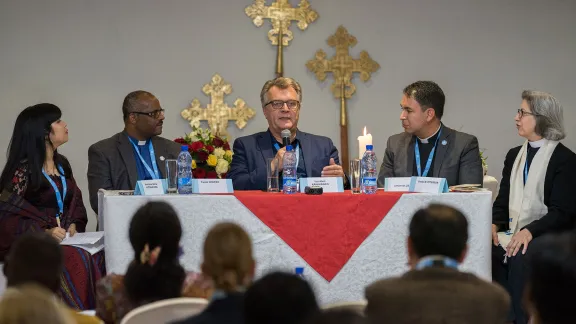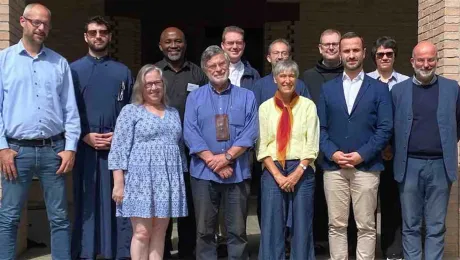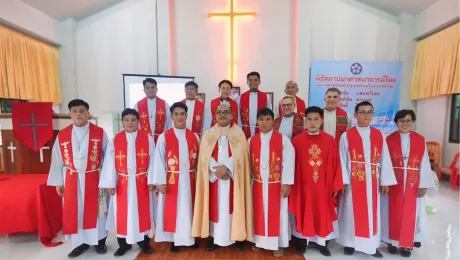
Professor Veli-Matti KaÃrkaÃinnen replies to a response panel to a paper of his. Gathered in Addis Ababa from 23-27 October 2019, Lutherans from across the globe join in consultation under the theme of 'We believe in the Holy Spirit: Global Perspectives on Lutheran Identities'. Hosted by the Ethiopian Evangelical Church Mekane Yesus, the consultation is the first phase of a study process on Lutheran identities. Photo: LWF/Albin Hillert
Contexts are vital for faith identities
(LWI) - What is a Lutheran understanding of the work of the Holy Spirit? How did Martin Luther write about the Holy Spirit’s work to call, gather and enlighten our lives? What are the Lutheran resources that can help us understand the work of the Holy Spirit in the public space? These were some of the questions raised by keynote speakers at a global consultation on Lutheran identities in Addis Ababa, Ethiopia, last week.
The Lutheran World Federation (LWF) organized the five-day gathering, bringing together around 70 participants including youth from the communion’s seven regions, and representatives of other Christian traditions.
Anchored in lived experiences
Rev. Dr Kenneth Mtata, General Secretary of the Zimbabwe Council of Churches, described the work of the Holy Spirit through the life and writings of South African Bishop Manas Buthelezi. Mtata noted that while Bishop Buthelezi was known as an outspoken anti-apartheid activist, he later embraced the role of the Holy Spirit in his life and theology. The link between justification and sanctification was anchored in his lived experience.
A Lutheran theology of the work of the Holy Spirit for our times “must characteristically lead to the revitalization of the ministries of the church not for the church’s sake but for the sake of the world,” Mtata said.
Bringing the truth of the gospel out of hiding
In her paper, Rev. Dr Jennifer Wasmuth, director of the Institute for Ecumenical Research in Strasbourg, France described the strong presence of the Holy Spirit in Luther’s theology. "As in the extensive body of writing of Martin Luther, there is no single treatise specifically on the Holy Spirit, one might be tempted to think that the Holy Spirit played only a peripheral role for Luther. The opposite, however, is true," Wasmuth said.
A good example, she added, is how Luther explains the Apostle’s Creed in the Small Catechism, in its third article explaining the Holy Spirit’s work in the life of the believer and the church. For Luther, Wasmuth said, “the essential work of the Holy Spirit is to bring the truth of the gospel out of hiding.”
Discerning the Spirit in the public space
“What about the public role of the Spirit in society, culture, sciences, ideologies?” Prof. Veli-Matti Kärkkäinen, Fuller Theological Seminary and University of Helsinki, posed this question in his presentation on the different spheres of the Spirit of God. He said there were Lutheran theological resources that could help discern the Spirit in the public space: He added that it was important to “not limit the work of the Spirit to salvation, the spiritual or the churchly.”
Kärkkäinen said a key question was how spiritual gifts were defined. “Everyone has such gifts – some of these gifts are extraordinary and others are ordinary – but they are present in all aspect of the life of every Christian, across the priesthood of all believers.”
Rooted in worship, Bible study and story telling
“We are nurturing our understanding of what it means to be Lutheran today,” reflected Rev. Dr Chad Rimmer, LWF study secretary for Lutheran Theology and Practice, as the consultation drew to a close. An important part of the consultation was to generate questions that can help discern that.
The keynote speeches were each elaborated by a panel of respondents and plenary interventions. Deeper discussion continued in regional groups where participants spoke about the realities lived by the member churches.
“Together we are forming the questions at the heart of this approach to understand Lutheran identity,” said Rimmer. “These days of theological reflection have been rooted in worship, Bible study, storytelling, and theological reflection. This has helped to embody what we are about – being and learning as a communion.”
“We Believe in the Holy Spirit: Global Perspectives on Lutheran Identities” takes place from 23 to 27 October in Addis Ababa, Ethiopia. The meeting is hosted by The Ethiopian Evangelical Church Mekane Yesus (EECMY). LWF study processes provide an opportunity for a shared theological approach to identifying and addressing contemporary issues that the member churches face.


